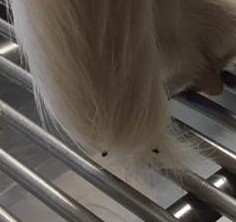
Common Signs of Fleas
- Patchy hair loss, especially near the tail or neck
- Itchy skin (scratching)
- Biting at his/her fur or legs
- Flea feces, or pepper-like specks, in your pet’s coat or on his/her bedding
- Flea eggs, or light-colored specks, in your pet’s coat or on his/her bedding
- Tiny, dark brown insects scurrying or jumping around on your pet or home
- Lethargy in severe cases

Flea life cycle
One adult female flea lays up to 50 eggs a day, which hatch and reproduce exponentially in a short time. Within the next two weeks, the eggs hatch into larvae, very small caterpillar-like creatures. The immature flea can remain in this stage for several days to a few weeks. The larvae then spin a cocoon and enter the pupae stage. Adults usually emerge from their cozy covering within 14 days but can survive in the cocoon for several months until vibration, pressure, heat, noise, humidity or carbon dioxide jolts them from their deep sleep. Once they emerge from the cocoon, adult fleas must find a warm-blooded host within a few days—or they’ll die. Once a flea finds your pet, it will live out its life happily feeding off your four-legged friend. In no time, these hungry parasites can become a persistent, itchy, and annoying problem.
_
Treating Your Pet
The best flea protection available on the market comes in the form of veterinarian-recommended flea products. Both topical and oral products are available. You must treat every pet in your house monthly for 6-18 months. When using topical products, bathing is not recommended as this can dilute the medication. There are many over-the-counter products available, however many of these chemicals may not be effective or safe for your pet.
Treating Your Home
Vacuum, vacuum, vacuum! Vacuuming is essential to your home treatment. This not only rids the environment of eggs and larvae, but the vacuum rollers can kill adults. Daily vacuuming is recommended while emptying bags or canisters after every use. All bedding should be washed weekly. Environmental house sprays are also available but be sure to follow the directions. In some cases, you may need to contact a professional exterminator.
